行为动词(一般现在时)
- 格式:ppt
- 大小:266.50 KB
- 文档页数:19
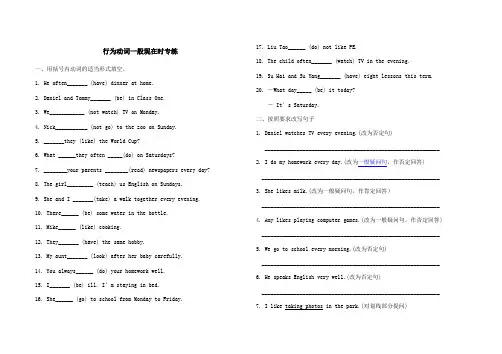
行为动词一般现在时专练一、用括号内动词的适当形式填空。
1. He often_______ (have) dinner at home.2. Daniel and Tommy_______ (be) in Class One.3. We____________ (not watch) TV on Monday.4. Nick___________ (not go) to the zoo on Sunday.5. _______they (like) the World Cup?6. What ______they often _____(do) on Saturdays?7. ________your parents ________(read) newspapers every day?8. The girl_________ (teach) us English on Sundays.9. She and I _______(take) a walk together every evening.10. There______ (be) some water in the bottle.11. Mike______ (like) cooking.12. They_______ (have) the same hobby.13. My aunt_______ (look) after her baby carefully.14. You always______ (do) your homework well.15. I_______ (be) ill. I’m staying in bed.16. She______ (go) to school from Monday to Friday. 17. Liu Tao______ (do) not like PE.18. The child often_______ (watch) TV in the evening.19. Su Hai and Su Yang_______ (have) eight lessons this term.20. -What day_____ (be) it today?-It’s Saturday.二、按照要求改写句子1. Daniel watches TV every evening.(改为否定句)____________________________________________________________ 2. I do my homework every day.(改为一般疑问句,作否定回答)_____________________________________________________________ 3. She likes milk.(改为一般疑问句,作肯定回答)_____________________________________________________________ 4. Amy likes playing computer games.(改为一般疑问句,作否定回答) _____________________________________________________________ 5. We go to school every morning.(改为否定句)_____________________________________________________________ 6. He speaks English very well.(改为否定句)_____________________________________________________________ 7. I like taking photos in the park.(对划线部分提问)_____________________________________________________________8. John comes from Canada.(对划线部分提问)______________________________________________________________9. She is always a good student.(改为一般疑问句,作否定回答)_______________________________________________________________10. Simon and Daniel like going skating.(改为否定句)_______________________________________________________________三、改错( )1. Is your brother speak English?( )2. Does he likes going fishing?( )3. He likes play games after class.( )4. Mr. Wu teachs us English.( )5. She don’t do her homework on Sundays.一般现在时用法专练:一、写出下列动词的第三人称单数drink ________ go _______ stay ________ make ________ look _________ have_______ pass_______ carry ____ come________ watch______ plant_______ fly ________ study_______ brush________ do_________ teach_______。
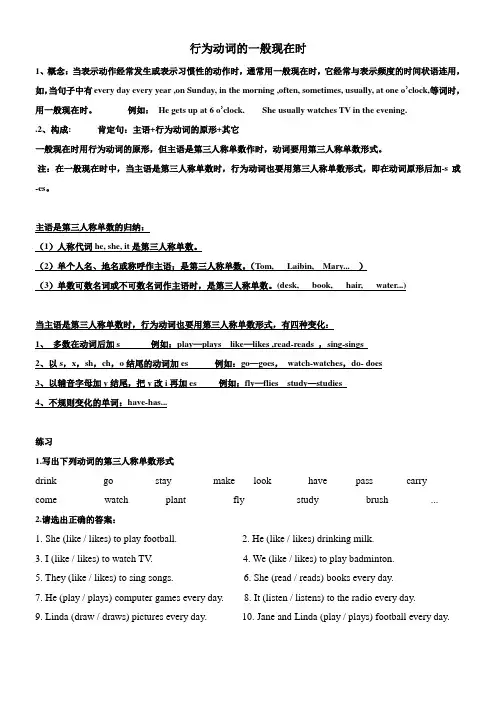
行为动词的一般现在时1、概念:当表示动作经常发生或表示习惯性的动作时,通常用一般现在时,它经常与表示频度的时间状语连用,如,当句子中有every day every year ,on Sunday, in the morning ,often, sometimes, usually, at one o’clock,等词时,用一般现在时。
例如:He gets up at 6 o’clock. She usually watches TV in the evening..2、构成: 肯定句:主语+行为动词的原形+其它一般现在时用行为动词的原形,但主语是第三人称单数作时,动词要用第三人称单数形式。
注:在一般现在时中,当主语是第三人称单数时,行为动词也要用第三人称单数形式,即在动词原形后加-s或-es。
主语是第三人称单数的归纳:(1)人称代词he, she, it是第三人称单数。
(2)单个人名、地名或称呼作主语;是第三人称单数。
(Tom, Laibin, Mary... )(3)单数可数名词或不可数名词作主语时,是第三人称单数。
(desk, book, hair, water...)当主语是第三人称单数时,行为动词也要用第三人称单数形式,有四种变化:1、多数在动词后加s例如:play—plays like—likes ,read-reads ,sing-sings2、以s,x,sh,ch,o结尾的动词加es例如:go—goes,watch-watches,do- does3、以辅音字母加y结尾,把y改i再加es例如:fly—flies study—studies4、不规则变化的单词:have-has...练习1.写出下列动词的第三人称单数形式drink ________ go _______ stay _______ make ___look ______ have_____ pass______ carry ______ come_________ watch_______ plant_________ fly __________study_________ brush________ ...2.请选出正确的答案:1. She (like / likes) to play football.2. He (like / likes) drinking milk.3. I (like / likes) to watch TV.4. We (like / likes) to play badminton.5. They (like / likes) to sing songs.6. She (read / reads) books every day.7. He (play / plays) computer games every day. 8. It (listen / listens) to the radio every day.9. Linda (draw / draws) pictures every day. 10. Jane and Linda (play / plays) football every day.行为动词的一般现在时1.肯定句:主语+行为动词的原形+其它当主语是第三人称单数时,行为动词也要用第三人称单数形式,2.否定句:主语+don’t( doesn’t ) +动词原形+其它如:①I like bread. 否定句:I don’t like bread. ②We eat fish . 否定句:We don’t eat fish. 当主语为第三人称单数时,要用doesn’t构成否定句。


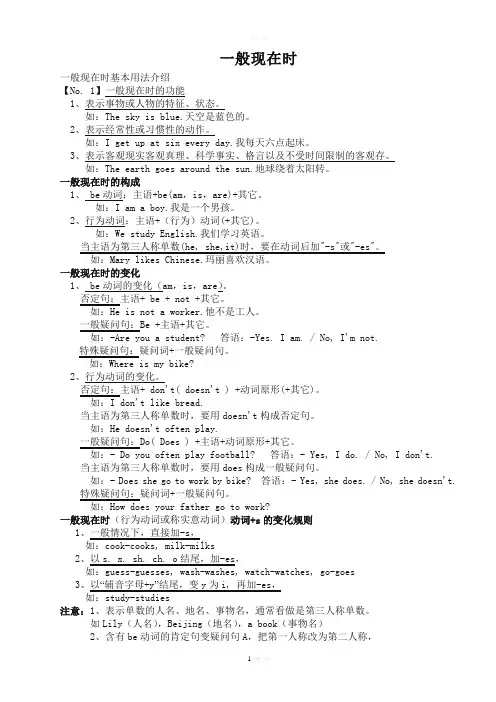
一般现在时一般现在时基本用法介绍【No. 1】一般现在时的功能1、表示事物或人物的特征、状态。
如:The sky is blue.天空是蓝色的。
2、表示经常性或习惯性的动作。
如:I get up at six every day.我每天六点起床。
3、表示客观现实客观真理、科学事实、格言以及不受时间限制的客观存。
如:The earth goes around the sun.地球绕着太阳转。
一般现在时的构成1、 be动词:主语+be(am,is,are)+其它。
如:I am a boy.我是一个男孩。
2、行为动词:主语+(行为)动词(+其它)。
如:We study English.我们学习英语。
当主语为第三人称单数(he, she,it)时,要在动词后加"-s"或"-es"。
一般现在时的变化1、 be动词的变化(am,is,are)。
否定句:主语+ be + not +其它。
他不是工人。
一般疑问句:Be +主语+其它。
答语:-Yes. I am. / No, I'm not.特殊疑问句:疑问词+一般疑问句。
2、行为动词的变化。
否定句:主语+ don't( doesn't ) +动词原形(+其它)。
如:I don't like bread.当主语为第三人称单数时,要用doesn't构成否定句。
如:He doesn't often play.一般疑问句:Do( Does ) +主语+动词原形+其它。
答语:- Yes, I do. / No, I don't.当主语为第三人称单数时,要用does构成一般疑问句。
如:- Does she go to work by bike? 答语:- Yes, she does. / No, she doesn't.特殊疑问句:疑问词+一般疑问句。
一般现在时(行为动词或称实意动词)动词+s的变化规则1、一般情况下,直接加-s,2、以s. x. sh. ch. o结尾,加-es,3、以“辅音字母+y”结尾,变y为i, 再加-es,如:study-studies注意:1、表示单数的人名、地名、事物名,通常看做是第三人称单数。
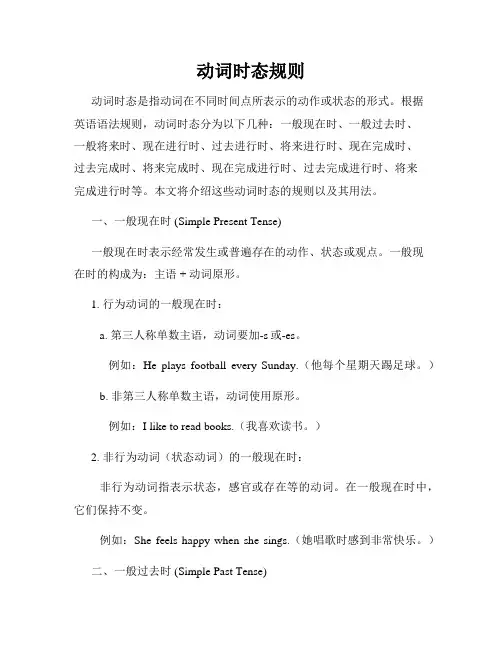
动词时态规则动词时态是指动词在不同时间点所表示的动作或状态的形式。
根据英语语法规则,动词时态分为以下几种:一般现在时、一般过去时、一般将来时、现在进行时、过去进行时、将来进行时、现在完成时、过去完成时、将来完成时、现在完成进行时、过去完成进行时、将来完成进行时等。
本文将介绍这些动词时态的规则以及其用法。
一、一般现在时 (Simple Present Tense)一般现在时表示经常发生或普遍存在的动作、状态或观点。
一般现在时的构成为:主语 + 动词原形。
1. 行为动词的一般现在时:a. 第三人称单数主语,动词要加-s或-es。
例如:He plays football every Sunday.(他每个星期天踢足球。
)b. 非第三人称单数主语,动词使用原形。
例如:I like to read books.(我喜欢读书。
)2. 非行为动词(状态动词)的一般现在时:非行为动词指表示状态,感官或存在等的动词。
在一般现在时中,它们保持不变。
例如:She feels happy when she sings.(她唱歌时感到非常快乐。
)二、一般过去时 (Simple Past Tense)一般过去时表示过去发生的具体动作、状态或习惯动作。
一般过去时的构成为:主语 + 动词过去式。
1. 行为动词的一般过去时:a. 所有人称主语,动词使用过去式。
例如:They watched a movie last night.(他们昨晚看了一部电影。
)b. 动词过去式为不规则动词的规则形式。
例如:She went to school yesterday.(她昨天去上学了。
)2. 非行为动词(状态动词)的一般过去时:非行为动词在一般过去时中,仍保持不变。
例如:I knew the answer to the question.(我知道问题的答案。
)三、一般将来时 (Simple Future Tense)一般将来时表示将要发生的动作、事件或存在的状态。
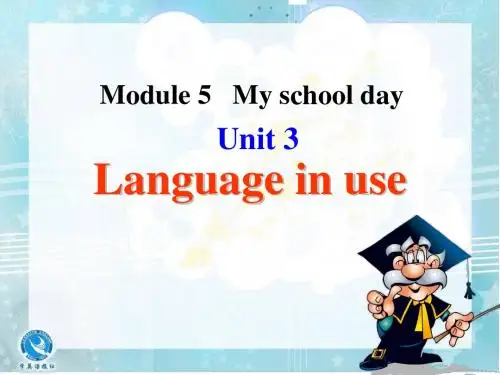

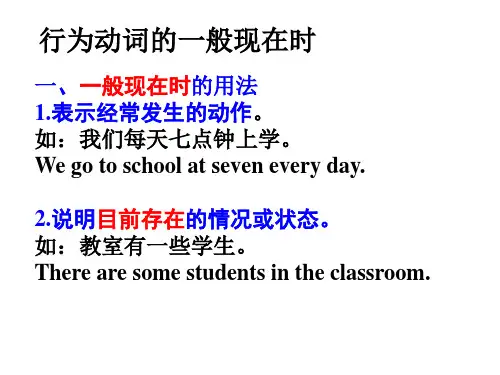
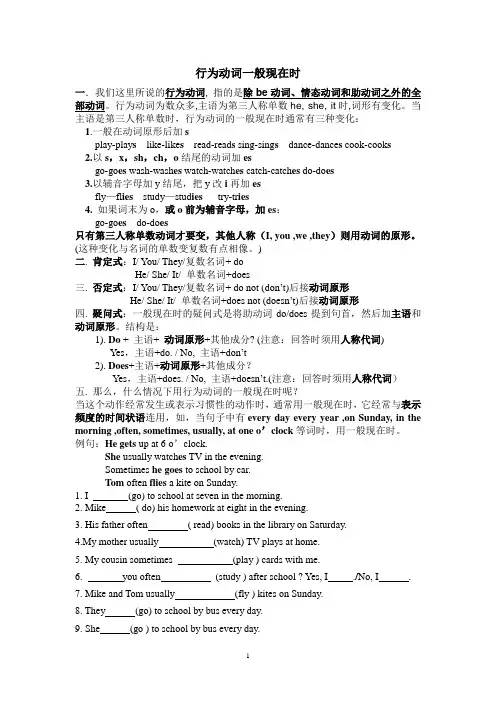
行为动词一般现在时一.我们这里所说的行为动词, 指的是除be动词、情态动词和助动词之外的全部动词。
行为动词为数众多,主语为第三人称单数he, she, it时,词形有变化。
当主语是第三人称单数时,行为动词的一般现在时通常有三种变化:1.一般在动词原形后加splay-play s like-like s read-read s sing-sing s dance-dance s cook-cook s2.以s,x,sh,ch,o结尾的动词加esgo-go es wash-wash es watch-watch es catch-catch es do-do es3.以辅音字母加y结尾,把y改i再加esfly—fl ies study—stud ies try-tr ies4.如果词末为o,或o前为辅音字母,加es:go-go es do-do es只有第三人称单数动词才要变,其他人称(I, you ,we ,they)则用动词的原形。
(这种变化与名词的单数变复数有点相像。
)二. 肯定式:I/ You/ They/复数名词+ doHe/ She/ It/ 单数名词+does三. 否定式:I/ You/ They/复数名词+ do not (don’t)后接动词原形He/ She/ It/ 单数名词+does not (doesn’t)后接动词原形四. 疑问式:一般现在时的疑问式是将助动词do/does提到句首,然后加主语和动词原形。
结构是:1). Do + 主语+ 动词原形+其他成分? (注意:回答时须用人称代词)Yes,主语+do. / No, 主语+don’t2). Does+主语+动词原形+其他成分?Yes,主语+does. / No, 主语+doesn’t.(注意:回答时须用人称代词)五. 那么,什么情况下用行为动词的一般现在时呢?当这个动作经常发生或表示习惯性的动作时,通常用一般现在时,它经常与表示频度的时间状语连用,如,当句子中有every day every year ,on Sunday, in the morning ,often, sometimes, usually, at one o’clock等词时,用一般现在时。
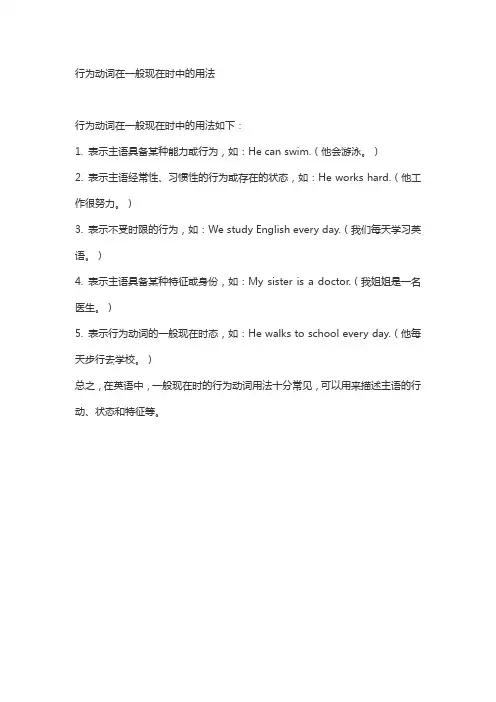
行为动词在一般现在时中的用法
行为动词在一般现在时中的用法如下:
1. 表示主语具备某种能力或行为,如:He can swim.(他会游泳。
)
2. 表示主语经常性、习惯性的行为或存在的状态,如:He works hard.(他工作很努力。
)
3. 表示不受时限的行为,如:We study English every day.(我们每天学习英语。
)
4. 表示主语具备某种特征或身份,如:My sister is a doctor.(我姐姐是一名医生。
)
5. 表示行为动词的一般现在时态,如:He walks to school every day.(他每天步行去学校。
)
总之,在英语中,一般现在时的行为动词用法十分常见,可以用来描述主语的行动、状态和特征等。
一般现在时一般现在时的用法:1. 表示事物或人物的特征、状态。
如:The sky is blue.天空是蓝色的。
2. 表示经常性或习惯性的动作。
如:I get up at six every day.我每天六点起床。
3. 表示客观现实。
如:The earth goes around the sun.地球绕着太阳转。
一般现在时的结构:1. be动词:主语+be(am ,is, are)+其它。
如:I am a boy.我是一个男孩。
2. 行为动词:主语+ 行为动词(+ 其它 )。
如: We study English.我们学习英语。
当主语为第三人称单数(he, she, it) 时,要在动词后加"-s" 或 "-es"。
如:Mary likes Chinese.玛丽喜欢汉语。
一般现在时常用的时间词: often, usually,sometimes,everyday(week,year...) 等。
A.第三人称单数形式的构成一般现在时主语是第三人称单数时,谓语动词后要加s 或 es ,其变化规则与名词变复数的方法大体相同:1.一般情况下只在动词后加s ,如 work-works, write-writes.2.以o,s, x, sh, ch结尾的动词,后加es ,如guess-guesses, mix-mixes,finish-finishes, catch-catches.3.以辅音字母加y 结尾的动词,改y 为 i 加 es ,如 study-studies.注:不规则变化的有have-hasI. 用 be动词的适当形式填空1. __________ your father a worker﹖Yes, he __________.2.They __________ in the classroom.3.Where __________ my books﹖4.These ___________her pears.5.How much _________the T-shirt?6.How much __________ the socks?8.You can _________ in our school music club.9.Let's ___________friends.10.He and I _________friends.12.There ____ some apples on the table yesterday.IV. 用所给词的正确形式填空。
一、练习题:今天我们来复习《在一般现在时里行为动词的用法》。
首先,我们来翻译下面的句子吧!1、我们每天都去上学。
肯定句:__________________________________ 否定句:__________________________________ 一般疑问句:______________________________ 简短回答:________________________________ 2、他们下课后打扫教室。
肯定句:__________________________________ 否定句:__________________________________ 一般疑问句:______________________________ 简短回答:________________________________ 3、有时候你们在操场上踢足球。
肯定句:__________________________________ 否定句:__________________________________ 一般疑问句:______________________________ 简短回答:________________________________ 4、我在晚上做作业。
肯定句:__________________________________ 否定句:__________________________________ 一般疑问句:______________________________ 简短回答:________________________________ 5、你喜欢英语。
肯定句:__________________________________ 否定句:__________________________________ 一般疑问句:______________________________ 简短回答:________________________________ 6、她经常在7点钟起床。
中考英语语法行为动词的一般现在时复习讲义及用法总结行为动词的一般现在时除了be动词(am,is,are)、助动词、情态动词以外的动词全部称为行为动词。
在行为动词的句型中,主语为第三人称单数时的动词变化要特别注意(构成参见(第9章动词概说))。
行为动词一般现在时的否定句和一般疑问句要加do/does,这和be动词是不同的。
1.行为动词一般现在时的肯定句I play baseball every Sunday.(我每个星期日都打棒球。
)She usually does her homework at school.(她通常在学校做作业。
)(1)主语为第一、二人称或第三人称复数时主语为第一人称I/we、第二人称you或第三人称复数时,谓语动词没有形式的变化。
句型:主语(除第三人称单数外)+行为动词(原形)+……I go to school every day.(我每天去上学。
)We have three children.(我们有三个孩子。
)You sing very well.(你(们)唱得很棒。
)They live far from school.(他们住得离学校远。
)(2)主语为第三人称单数时主语为第三人称单数时,谓语动词的一般现在时形式有变化,变化规律和名词的单数变复数形式相同。
句型:主语(第三人称单数)+行为动词(-s/-es)+……He always wears (in) black.(他总是穿黑色的衣服。
)She often gets up at half past six.(她经常六点半起床。
)Who(主语)looks after(谓语)the baby?(谁照看这个婴儿?)(2)特殊疑问句的回答特殊疑问句不能用yes/no回答。
由于在问句中出现do/does,所以动词保持原形,但回答时,动词要视主语而决定是否加-s等。
A:Where does her father work?(她父亲在哪儿工作?)B:He works in an iron factory.(他在一家铁制品厂工作。